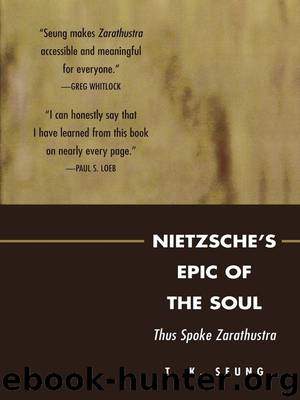Nietzsche's Epic of the Soul: Thus Spoke Zarathustra by Seung T. K. & Seung T. K

Author:Seung, T. K. & Seung, T. K. [Seung, T. K.]
Language: eng
Format: epub
ISBN: 9780739158234
Publisher: Lexington Books
Published: 2005-06-14T00:00:00+00:00
Mother Nature and her Poetic Images (Part III.2, 4, 13)
After Zarathustra’s explosion of his great disgust with man, his animals ask him to stop speaking and go out to the world that awaits him like a garden. They recommend singing for his convalescence and then sing a long song to cheer him up. Suspecting that he wants to die, they try to fathom his fear of death, that is, he may fear that he will become nothing when he dies because the soul is as mortal as the body. They try to dissolve this presumed fear by saying that he will come back again and again because he is entangled in the causal chain of eternal recurrence. That is, his immortality is secured in the eternal recurrence. Bernd Magnus says that the doctrine of eternal recurrence may express kronophobia, the fear that time will destroy everything (Nietzsche’s Existential Imperative , 190-95). This fear may be attributed to Zarathustra’s animals, but not to him. Hence their attempt to console him backfires. Their talk of eternal recurrence and its immutable causal chain only aggravates Zarathustra’s revulsion, because it reminds him of the inevitable recurrence of the disgusting small man. But the animals have no understanding of his disgust because of the unbridgeable chasm between the humans and the animals.
The animals conclude their final song by predicting that Zarathustra will return again and again to teach the eternal recurrence of all things and to proclaim the superman. Then they add an intriguing sentence: “I spoke my word, I break to pieces (zerbreche) at my word: thus my eternal lot wants it; as a proclaimer I perish.” This sentence, which is supposed to represent Zarathustra’s thought, echoes back to the stern command from the voiceless voice in “The Stillest Hour” of Part II: “Speak thy word and break (zerbrich) to pieces.” What is the word to be spoken? It is the unspeakable ‘it’. It is the collision of two wills, which are now stated in terms of Zarathustra’s two missions mentioned by the animals: to teach the eternal recurrence and to proclaim the superman. In proclaiming the superman, he placed all his hope on the autonomous creative will, but its possibility has been shattered by the heteronomous will embedded in the iron ring of eternal recurrence.
If Zarathustra had spoken “it” out loud, he would have broken to pieces long ago. So he refused to say it to the hunchback and to his disciples in “On Redemption” of Part II. For this refusal, the awesome lady in “The Stillest Hour” of Part II became angry and told him: “Speak thy word and break (zerbrich) to pieces.” He was then resisting her command for him to go through the metamorphosis from a lion to a child. He has now finally spoken “it” and is indeed broken to pieces. In “On Self-Overcoming” of Part II, he said, “But a more violent force and a new overcoming grow out of your values and break egg and eggshell” (Z, 116).
Download
This site does not store any files on its server. We only index and link to content provided by other sites. Please contact the content providers to delete copyright contents if any and email us, we'll remove relevant links or contents immediately.
| African | Asian |
| Australian & Oceanian | Canadian |
| Caribbean & Latin American | European |
| Jewish | Middle Eastern |
| Russian | United States |
4 3 2 1: A Novel by Paul Auster(12393)
The handmaid's tale by Margaret Atwood(7764)
Giovanni's Room by James Baldwin(7346)
Asking the Right Questions: A Guide to Critical Thinking by M. Neil Browne & Stuart M. Keeley(5775)
Big Magic: Creative Living Beyond Fear by Elizabeth Gilbert(5773)
Ego Is the Enemy by Ryan Holiday(5450)
The Body: A Guide for Occupants by Bill Bryson(5097)
On Writing A Memoir of the Craft by Stephen King(4944)
Ken Follett - World without end by Ken Follett(4733)
Adulting by Kelly Williams Brown(4574)
Bluets by Maggie Nelson(4556)
Eat That Frog! by Brian Tracy(4540)
Guilty Pleasures by Laurell K Hamilton(4449)
The Poetry of Pablo Neruda by Pablo Neruda(4109)
Alive: The Story of the Andes Survivors by Piers Paul Read(4033)
White Noise - A Novel by Don DeLillo(4011)
Fingerprints of the Gods by Graham Hancock(4004)
The Book of Joy by Dalai Lama(3986)
The Bookshop by Penelope Fitzgerald(3854)
